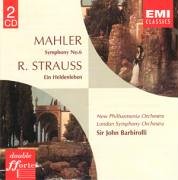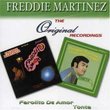| All Artists: Gustav Mahler, Richard Strauss, John Barbirolli, New Philharmonia Orchestra (Mahler), London Symphony Orchestra (Strauss) Title: Mahler: Symphony No. 6 / R. Strauss: Ein Heldenleben Members Wishing: 0 Total Copies: 0 Label: Angel Records Release Date: 1/21/1997 Genre: Classical Styles: Forms & Genres, Theatrical, Incidental & Program Music, Historical Periods, Modern, 20th, & 21st Century, Symphonies Number of Discs: 2 SwapaCD Credits: 2 UPC: 724356934924 |
Search - Gustav Mahler, Richard Strauss, John Barbirolli :: Mahler: Symphony No. 6 / R. Strauss: Ein Heldenleben
 | Gustav Mahler, Richard Strauss, John Barbirolli Mahler: Symphony No. 6 / R. Strauss: Ein Heldenleben Genre: Classical
|
Larger Image |
CD DetailsSimilar CDs |
CD ReviewsThe "Real Thing" kakistocracy | Omaha, NE United States | 04/25/2002 (5 out of 5 stars) "Mahler is a composer who, intentionally or not, sometimes lapses into a state of melodrama where his objectives may be unclear to the listener. This is seldom truer than in Mahler's Sixth, where the "tragedy" often seems more conceived than really felt, as opposed to the indisputable emotional veracity of a work like Bruckner's Ninth or, less disputably, Mahler's own Ninth. Bernstein's temperament was particularly well suited to Mahler's histrionic nature (incidentally, Bernstein was not a great Bruckner conductor), but Barbirolli comes closer than anyone in making the tragedy, even horror, of this symphony sound real. Just a few seconds of the very martial opening movement will convince you that this is like no other performance. The sound (from 1967) is very good. I can't comment on the performance of "Ein Heldenleben" because I have the original CD issue coupled with Strauss' "Metamorphoses"." A must-have version Keli Song | Boston, MA, USA | 04/30/2002 (5 out of 5 stars) "This is my favorite version of Mahler Symphony No.6. Some people may think that there is too much of tragedy right from the beginning and the starting tempo is a little draggy compared to most other versions. But I don't feel that way at all. In contrast, I think Barbirolli's expression and tempo is just absolutely right. There is a real sense of tragedy and our MAN in the music is determined in facing the fate. Put it in short: this performance is the most convincing and satisfactory to me." Sir John Forever Good Stuff | 12/01/2003 (5 out of 5 stars) "This recording has had an odd history. When first released on LP in Great Britain, the companion piece was Sir John's recording of Strauss' "Metamorphosen". When it was released in the U.S., although the cover art still proclaimed "Metamorphosen" as the companion piece, it was no where to be found. The 6th stood alone, covering all four LP sides, albeit with a side break in the final movement.When it was initally released on CD, "Metamorphosen" reappeared.Now, "Metamorphosen" seems to have, well, metamorphed into "Ein Heldenleben". Such are the exigencies of the record companies these days.I can't recall I've ever heard Sir John's "Ein Heldenleben", so I will not comment on it.However, as for this recording of the Mahler Sixth, first let me say that I was fortunate enough to see and hear Sir John conduct Mahler live, in the house. Toward the end of his life he conducted a series of concerts with the Los Angeles Philharmonic that included the Mahler Ninth. It was one of the greatest live performances I have ever been fortunate enough to attend, ranking up there with Rubenstein's Beethoven 3rd Piano Concerto, Nilsson's Elektra, Varnay's Senta, Sills' Roberto Devereux, and Klemperer's Brahms German Requiem. I purchased Sir John's recording of the Ninth and, I must admit, was a bit disappointed. It just didn't seem quite the same. I came to the conclusion it just simply is never as good on record as it is in the house.That conclusion was blown all to hell when I first heard this remarkable recording of the Mahler Sixth.Superlatives are superflous here. Adjectives are hopeless.I have simply never heard another performance of this work that is so jaw droppingly overwhelming.If this recording doesn't have a profound effect on you, well, you must be dead!!!"
|

 Track Listings (10) - Disc #1
Track Listings (10) - Disc #1![Money Maid [Vinyl]](/images/no_cover/m.png?v=430e6b0a)

